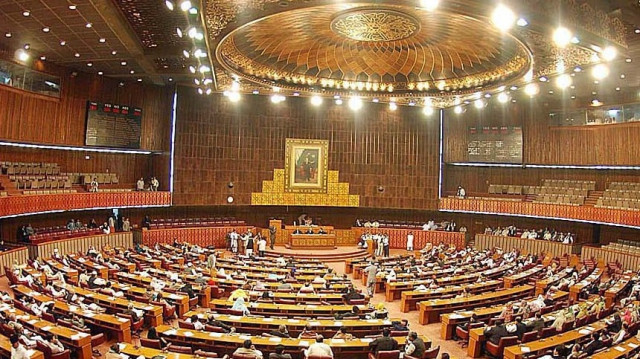National Assembly approves 19th amendment bill
19th amendment bill unanimously approved in National Assembly, sent to senate for approval.

The National Assembly on Wednesday unanimously approved the 19th amendment bill. The bill has now been moved to the upper house for approval.
Earlier, the Federal Cabinet had approved the draft of the 19th amendment bill, which was tabled in parliament by Senator Raza Rabbani.
The Constitutional Reforms Committee had unanimously crafted the bill, in the light of directions by the Supreme Court. Amendments had been recommended in six clauses of the constitution.
Updated from print version (below)
19th constitutional amendment: All set to amend the constitution, again
The top political leadership on Tuesday dispelled fears of confrontation among state institutions as the lower house of parliament prepared to amend the constitution for a second time in a year, this time in compliance with a Supreme Court order.
“All those who were predicting confrontation among state institutions will be disappointed today,” Senator Raza Rabbani told lawmakers after tabling in the National Assembly a report on the 19th constitutional amendment.
The fresh amendment seeks changes in a two-pronged mechanism for appointing judges in the superior courts in light of proposals forwarded to the parliament by the Supreme Court in its order.
The apex court’s order came in response to several legal challenges to the judges’ appointment mechanism envisaged in Article 175A of the 18th amendment, approved by parliament earlier this year.
The amendment is likely to be passed by the National Assembly and the Senate in their current sessions after a ceremonial approval by the federal cabinet today (Wednesday).
According to the new mechanism, the prime minister would also have a ‘symbolic’ say in the procedure. A parliamentary committee to finalise nominations by a judicial commission would have to cite reasons for rejections.
Furnished by a 26-member all-party parliamentary committee, the amendment has suggested changes to Article 175A of the constitution that deals with the appointment of judges in the superior courts.
The report by the Parliamentary Committee on Constitutional Reforms (PCCR) has increased the number of members of a judicial commission formed for appointments under the 18th amendment.
The commission to be headed by the chief justice would now have as members three serving and one retired judge in addition to the federal law minister, the attorney general and a representative of the Pakistan Bar Council (PBC). It also specifies 15 years experience for the PBC representative.
According to the draft of the 19th amendment, the judicial commission could not resend the nomination of a person who was once rejected by the parliamentary committee. But in case of rejection the parliamentary committee would have to give reasons.
If a nomination is not confirmed, the judicial commission would have to send another one. In case the National Assembly is dissolved the members of the committee from the Senate would take over this job.
If confirmed, the committee would send the name of the nominee to the prime minister to be forward to the president for appointment.
More powerful than ever before
Speaking in the National Assembly, Prime Minister Yousaf Raza Gilani called the consensus on the amendment “a gift for the nation.” He said those who had been doubtful about the powers of the incumbent parliament were mistaken.
“I tell you this parliament is more powerful than all in the past, otherwise bringing two amendments to the constitution in a year would have not been possible,” he said in a brief speech after the report.
“The political leadership of the country has shown maturity by agreeing to this amendment, history will remember them,” he added.
Senator Rabbani, who heads the PCCR, said the consensus on the amendments shows democracy is gaining strength in Pakistan.
Published in The Express Tribune, December 22nd, 2010.



















COMMENTS
Comments are moderated and generally will be posted if they are on-topic and not abusive.
For more information, please see our Comments FAQ